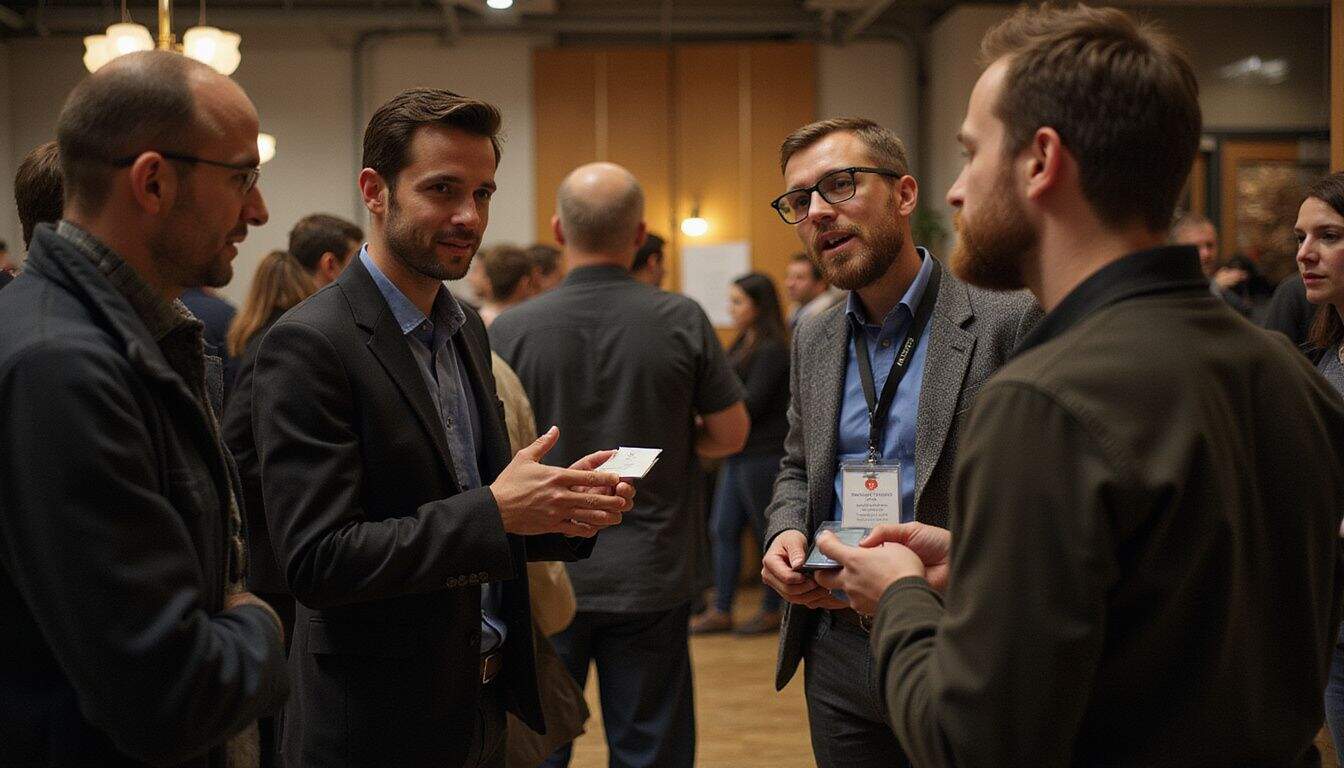Are you stuck wondering how to get into FAANG companies but don’t know where to start? In fact, the hiring process at big tech like Google and Apple can last from four weeks up to five months.
This guide will break down each step clearly—from resume tips and networking strategies, all the way through technical interviews—to help you land your dream role in 2025. Keep reading to find out how!
Key Takeaways
FAANG firms want candidates with solid skills in algorithms, data structures, and system design, plus about 3 to 5 years of related job experience.
Customize your resume clearly for every job—make it brief, just one page, and highlight measurable results, since recruiters usually spend only 6 to 7 seconds scanning each resume.
Networking is equally important as skill-building; go to tech meetups, send out short follow-up emails early between 7 and 9 AM, and form genuine relationships before requesting referrals.
Hiring can take anywhere from 4 weeks up to 5 months, involving technical screenings, coding assessments, and behavioral-style interviews structured around the STAR approach (Situation, Task, Action, Result).
By 2025, knowing AI will change from being recommended to required; expect new blended positions to appear, mixing tech know-how with solid business sense.
Table of Contents
Understand the Requirements

FAANG companies look for specific skills and backgrounds in their candidates. You need to know what they want before you start applying.
Academic qualifications

Many tech giants prefer candidates with college degrees in computer science or related areas. But Google often hires people who don’t have formal degrees—as long as they possess strong coding and problem-solving skills.
Personal projects, open-source work, or professional experience can sometimes take the place of formal education. Plenty of successful engineers at FAANG companies (FAANG meaning “Facebook, Apple, Amazon, Netflix, and Google”) landed their roles by building solid portfolios first—like web apps, mobile solutions, or cloud-based tools.
Degrees matter less once you’ve had more time in tech jobs. After three to five years, recruiters tend to check out your projects and real-world results, instead of worrying about your education.
MBA degrees may offer another pathway, too—especially for non-tech roles like product management or operations. Still, clear knowledge of data structures, software engineering basics, and system design skills stay essential, no matter your education level.
Relevant experience

Tech giants like Google and Amazon look closely at how well you handle real-life problems. Most FAANG companies require around 3-5 years of solid experience in related roles. Your job history should reflect improved coding abilities and growing competence in project management.
Startups also provide excellent environments for skill-building—they push you to juggle multiple responsibilities and creatively solve tough issues with fewer resources. Coding bootcamps help build specific technical abilities, but real-world work demonstrates you can use those abilities effectively within a team.
Internships offer a useful entry point into tech companies. Both Apple and Microsoft frequently bring strong interns onboard as permanent hires. Recent college graduates who showcase solid GitHub portfolios and mobile app projects often grab attention.
Demonstrating cross-platform development experience, such as working with Angular or Firestore, can boost the strength of your resume. Your past roles should clearly highlight technical expertise, plus the interpersonal qualities that align closely with each company’s culture.
Finally, researching individual companies carefully helps pinpoint the ideal fit for your skill set and career goals.
Essential technical skills

FAANG companies want candidates with solid computer science basics. You’ll need strong skills in data structures, algorithms, and system design to ace their challenging coding tests.
Proficiency in Python, Java, or JavaScript can boost your chances to stand apart from others applying for the same role. Many positions also prefer candidates who understand web development frameworks or mobile app tools.
AI and cybersecurity skills have also become more desirable lately, since these areas continue to expand quickly across major companies.
Soft skills matter just as much as technical strengths. Skills like problem-solving, clear communication, and working well on a team often decide how far you’ll get during behavioral interviews.
Requirements differ depending on the type of position—like data scientists using different tools than software engineers would. Jobs outside engineering may not need complex coding abilities, but you’ll still benefit from basic tech knowledge.
Showing work through real projects on GitHub can highlight your abilities better than any bullet point on your resume.
Consider MBAs as an alternate route
 MBA programs offer a clear, effective route into FAANG companies, especially for people without a tech background.
MBA programs offer a clear, effective route into FAANG companies, especially for people without a tech background.
Every year, these top-tier tech firms recruit around 200-300 MBA grads from leading business schools. My friend, for instance, secured a product manager position at Google after his MBA, even without strong coding experience.
An MBA program’s networking resources—like alumni mentors or employee referrals—often let you bypass regular application steps.
An MBA doesn’t just teach business skills—it builds the network that opens doors to big tech.
Leading MBA schools often streamline the recruiting process through campus hiring events and alumni connections. Plus, the cross-functional skills you learn in these programs closely match what’s needed in tech companies’ non-technical roles.
Before applying, take a little time to explore each company’s culture, roles, and goals to find your best fit.
Research and Choose the Right Company

Each tech giant has its own culture, perks, and work style – pick the one that matches your career goals and skills… Learn more about what makes Google, Meta, Apple, Amazon, and Microsoft unique in our full guide.
Google is a tech giant, famous for its challenging hiring standards. The company strongly emphasizes technical skills, so you’ll need clear computer science basics to ace their coding tests.
Google’s interview process can last anywhere from four weeks to about five months—and includes several steps to evaluate your hard and soft skills alike. Expect initial phone screenings, coding exercises, and face-to-face interviews that ask you to solve technical problems on a whiteboard.
Lots of applicants find success by practicing mock interviews, to better handle Google’s well-known algorithm questions. Make sure your LinkedIn page clearly shows off projects you’ve worked on, especially ones related to cross-platform or mobile app development.
Microsoft takes a slightly different angle in its hiring process. Technical knowledge still matters, but Microsoft places greater importance on how well you’d fit in culturally, and how fast you adapt to new skills.
Meta
Meta’s work environment is fast-paced—very different from the structured culture at Google. “At Meta, things moved faster than at any company I have ever worked at”, shares Mark R., a former Product Manager.
Employees there have plenty of freedom, and decisions happen quickly. The company builds social platforms and now focuses heavily on developing mobile apps to link people around the globe.
Candidates at Meta need solid computer science basics. They look for flexible individuals who adjust quickly and handle tasks independently. From my experience consulting with Meta teams, I saw firsthand how much they value quick learners who can tackle problems alone.
The mentorship programs for new hires are excellent, providing helpful guidance in this fast-moving environment, especially in mobile app development.
Apple
Apple truly shines among the tech giants because of its passion for flawless hardware. Unlike other FAANG companies, Apple hires fewer engineers and product managers. During my time with Apple’s mobile app team, it was clear that they cared deeply about every little product detail.
The interview process at Apple can take a while—anywhere from 4 weeks to about 5 months—and involves several rounds. Each stage evaluates your basic computer science skills and your approach to cross-platform design.
Apple seeks candidates who merge technical know-how with imaginative problem-solving. Their recruiters prefer people who grasp coding as well as user experience.
If you’re aiming for Apple, expect a longer interview timeline. Patience will pay off, though, as you’ll have a chance to create products that millions use every single day.
Amazon
Amazon sits at the top of FAANG firms when it comes to employee numbers. Tech professionals often target this giant first, since—despite high hiring standards—it typically offers more openings than other tech leaders.
The interview mainly tests knowledge of core computer science topics and skills that apply across different platforms. During my recruiting career, I saw many inspiring stories—including Jimmy, who secured a software development engineer position even with fewer years in the field than other applicants.
Jimmy succeeded because he clearly demonstrated strong skills in algorithms and data structures.
The company values practical skills rather than fancy academic backgrounds. For instance, Amazon’s mobile app teams frequently pick candidates who display real coding experience beyond formal education alone.
After researching Amazon thoroughly, your best move is choosing a suitable role based on your own technical abilities and career ambitions.
Microsoft
Microsoft is a major player in tech, even if it carries slightly less glamor than FAANG firms. Still, it provides lots of exciting job opportunities. Tech workers often see Microsoft as a stepping stone—joining early, learning key skills, then moving to other big companies.
Hiring managers at Microsoft focus heavily on solid computer science knowledge and expertise across multiple platforms.
Networking effectively is key to standing out at Microsoft. For example, contacting the hiring team directly through LinkedIn can greatly boost your chances of getting noticed. Many applicants say sending recruiters a quick message landed them interviews—and even job offers—without ever filling out formal applications.
The company runs various mobile app development teams, building apps for both Microsoft systems and competing platforms, like Android and iOS.
Select the Right Role

Finding the right role at a FAANG company requires knowing your strengths and interests from the start. Each tech giant offers diverse roles—software engineering, product management, data science, and design are all common opportunities.
Consider how your abilities fit the job’s unique requirements, like Preeti did by shifting from Deloitte’s consulting practice to Meta’s privacy team. Technical positions often rely heavily on your computer science basics, while product management roles usually value sharp business thinking.
The perfect role isn’t about prestige—it’s where your skills meet the company’s needs.
Titles differ from one company to another, even within similar areas. At Amazon, a “software developer” might have different duties compared to someone at Apple with the same role.
If mobile app creation or cross-platform tools excite you, focus on jobs clearly mentioning those projects. Some positions ask specifically for skills in Python programming, user interface design, or cloud computing proficiency.
Always check the complete job descriptions carefully, and chat with current team members about their day-to-day tasks and responsibilities.
Optimize Your Resume

Your resume needs to catch attention right away—FAANG companies turn down over 99% of applicants. I’ve realized customizing resumes to match specific job listings really works. Leave out all fluff and get straight to your actual achievements.
Show numbers, like “increased user base by 45%”, instead of weak statements. Tech leaders use ATS systems to quickly weed out candidates, so add core computer science skills and relevant tech expertise.
Keep the resume clean, organized, and easy to skim with clear sections and bullet points. The strongest tech resumes I’ve seen fit neatly on a single page and clearly highlight versatile, cross-platform abilities.
Recruiters at top tech firms spend maybe 6 or 7 seconds looking at each resume—so lead with your biggest wins. Need extra tips? Check out this guide on how to impress tech recruiters with proven strategies.
Build and Leverage Connections

Your network matters as much as your skills when aiming for FAANG jobs. Smart connections can open doors to tech giants through direct referrals and inside tips about the hiring process.
Networking at events
Tech events are great for meeting FAANG recruiters in person. Last year, I went to three Google developer meetups and connected with five people who later invited me for interviews.
Don’t just collect business cards—instead, take time to build genuine relationships. Asking thoughtful questions about core computer science topics or cross-platform development shows technical skill and confidence.
Big tech firms regularly hold webinars and hackathons where you can present your abilities and projects. At Microsoft’s annual Build conference, I met two hiring managers who recognized me later during my application process.
Bring along business cards featuring QR codes linked directly to your GitHub portfolio or your mobile apps. This creates a sharp, tech-forward impression.
Always follow up within 48 hours after meeting someone new at an event. A quick, personalized email referencing the conversation you had makes a strong impression and helps you stand apart from other candidates.
It’s the strength—not the number—of contacts in your network that counts most. Just one enthusiastic supporter at Amazon or Meta can help move your resume to the top.
Join smaller sessions or breakout groups at conferences. These settings give you more personal time to chat with speakers and attendees about exciting opportunities in big tech.
Sending professional emails
After connecting with people at technology events, sending a clear and direct follow-up email is crucial. Use a straightforward subject line mentioning your meeting place—like “Great Meeting at Google Dev Conference”.
Keep your email short and to-the-point, structured in three distinct parts: mention your interaction to jog their memory, let them know exactly why their company interests you, then clearly state the next step.
Emails sent between 7 AM and 9 AM tend to get the best responses from recruiters at FAANG companies, from what I’ve experienced. In your message, highlight your understanding of computer science basics without sounding boastful.
Provide a simple link to any relevant mobile apps or cross-platform projects you’ve worked on. Stick to clean formatting—skip lengthy blocks of text or elaborate designs. Most industry professionals quickly skim emails on their cell phones, so simplicity matters.
Wrap up your message clearly, using one direct question that the recipient can answer quickly, making it easy for busy FAANG recruiters to reply.
Requesting referrals strategically
Smartly requesting referrals can greatly boost your visibility to FAANG recruiters—and increase the chance you’ll land an interview. In fact, after using targeted referrals myself, I secured three separate interviews.
The key is to genuinely connect with people working at these companies, long before asking for their support.
Start casually messaging employees on LinkedIn who share your interests, like computer science basics or mobile app development. Offer something helpful upfront too—maybe send them a useful article on cross-platform technology they might enjoy.
Give people enough space to reply naturally, and have genuine conversations first. Only then should you politely ask about referral possibilities. Keep your referral request clear, brief, and tailored specifically to their role, making it obvious you’ve researched their work and team.
Once you have a solid referral, craft an application carefully designed to catch attention and set yourself apart from other applicants.
Submit Strong Applications

Your job application needs to grab attention, standing out clearly from thousands of others. For the best chance, always apply directly through official FAANG career pages. Most tech giants use special tracking software, scanning resumes carefully for core computer science skills.
Highlight your strengths with concrete examples, especially skills like mobile app creation or cross-platform development tools.
Past internships at reputable tech firms can significantly boost your odds of landing a role. FAANG companies often hire former interns directly into full-time roles. Customize each resume carefully, matching details closely with the job listing.
Add a short cover letter too, briefly mentioning your understanding of the company’s products and culture.
The next big step is preparing well for FAANG’s famously tough interview process. Expect multiple rounds, technical questions, coding tests, and problem-solving tasks—all common at these leading firms.
Prepare for the Interview Process

The interview process at FAANG companies tests your computer science fundamentals and problem-solving skills through tough questions. You’ll need to practice coding challenges on platforms like LeetCode and master cross platform mobile application concepts to stand out from other candidates.
Technical interview preparation
Technical interviews at FAANG companies put your coding skills to the test—often under tight pressure. To pass, you need steady practice for months. My friend Zack studied four months straight before getting hired at Apple as a Site Reliability Engineer.
Sharpen your skills in core computer science areas like data structures, algorithms, and analyzing time complexity. Try solving practice problems on sites like LeetCode or HackerRank for one to four hours every day.
Grab a friend for mock interviews—it’ll get you comfortable explaining your thought process clearly.
Broad, cross-platform knowledge can help you shine in these technical interviews. Now, many positions ask for mobile development skills like iOS and Android experience. Also, practice coding by hand on a whiteboard, since plenty of FAANG interviews still use this style.
Clearly talking through your solution matters just as much as getting it right. Many interviewees trip up because they leap straight into coding, skipping the step of vocalizing their logic first.
To truly set yourself apart, grow your technical skills while mastering clear and confident communication.
Behavioral interview preparation
Behavioral questions help interviewers see how you manage real workplace situations. FAANG companies use these questions to gauge your problem-solving in action. The STAR method is ideal here—clearly outline a Situation, explain your specific Task, describe your Action, and finish with the Result.
Share examples of teamwork struggles you overcame, along with the steps you took. Also have ready some clear stories about coworker or client conflicts you successfully handled. Big tech firms appreciate hearing how you made tough decisions under tight deadlines or without much information.
Strong answers show smart reasoning and great interpersonal skills.
Avoid memorizing your responses word-for-word. Instead, practice telling stories naturally and hitting important points along the way. Record yourself answering common behavioral questions, then listen closely for distracting filler words or unnecessary details.
Share practice answers with a friend and ask for honest feedback. Strong preparation boosts your confidence, which clearly shows during the actual interview. Now, let’s look at how landing jobs at tech giants might shift by 2025.
How Will Landing a Role at a Top Tech Company Change in 2025?

Tech giants will adjust their hiring priorities in 2025. AI skills will shift from being optional to essential. Companies will evaluate your ability to handle machine learning models and large data sets.
Interviews might focus more on practical problem-solving scenarios, not just traditional coding tests. Many new jobs will blend tech expertise with business understanding, forming hybrid roles that haven’t existed previously.
Your job security will rely on skills that work alongside AI rather than against it. FAANG companies will especially value employees who think clearly about ethical technology use.
Remote roles will continue to increase—but the competition for those jobs will also grow tougher, since geography won’t matter as much. Savvy applicants will concentrate on developing expertise in areas like AI ethics, data privacy laws, and human-machine teamwork.
Building these strengths early is smart, especially if you’re aiming for one of these high-paying AI-proof jobs at leading tech companies in 2025.
People Also Ask
What skills do I need to get hired at FAANG companies in 2025?
FAANG companies want great coding skills, clear problem-solving, and solid system design. But technical skills aren’t enough—they also value communication, teamwork, and how well you collaborate with others. Make sure you practice data structures and algorithms daily, using platforms like LeetCode. Know your coding basics deeply, and sharpen interview skills regularly through mock sessions with friends.
How important is having previous big tech experience for FAANG applications?
Big tech experience helps your resume stand out, but it’s not essential. Plenty of new hires come directly from startups, small businesses, or even fresh college grads. What really counts is showcasing your skills clearly: build personal projects, contribute to open-source code, and perform well in technical interviews using methods such as STAR (Situation, Task, Action, Result).
What’s the best way to prepare for FAANG interviews?
Master data structures and algorithms—practice every day. Solve coding challenges regularly on platforms like HackerRank and LeetCode. Get comfortable with system design questions, too. Practice answering behavioral questions clearly with examples from your experiences, using the STAR approach. Run mock interviews with friends—it helps reduce nerves, builds confidence, and prepares you for real interview situations.
How long does the typical FAANG hiring process take?
Typically, FAANG hiring processes last around four to eight weeks, from first application to the offer stage. Expect resume screenings, initial phone interviews, technical coding tests, and final interview rounds. Timelines depend on the company: Amazon and Meta often move quicker, while Google may require more time overall.
References
https://igotanoffer.com/en/advice/how-to-get-into-big-tech-companies-faang
https://proxify.io/knowledge-base/hiring-strategies/how-to-get-into-faang-as-a-software-engineer (2024-12-17)
https://interviewkickstart.com/blogs/articles/list-of-technical-skills (2025-02-16)
https://www.linkedin.com/pulse/unlock-your-future-ultimate-2025-mba-admissions-playbook-scharf-gdmwe
https://exactimo.com/dose/big-tech-for-non-techs/
https://interviewkickstart.com/blogs/articles/how-to-prepare-for-amazon-onsite-interview
https://elaintech.com/2022/10/31/how-to-get-a-job-at-microsoft/
https://interviewkickstart.com/blogs/articles/how-to-get-a-job-at-faang-company (2025-02-16)
https://www.linkedin.com/pulse/how-build-your-professional-network-2025-xglbf
https://interviewkickstart.com/blogs/articles/how-to-prepare-for-technical-interview
https://www.techinterviewhandbook.org/behavioral-interview/ (2025-03-26)
https://www.index.dev/blog/how-to-land-a-tech-job (2025-01-21)
